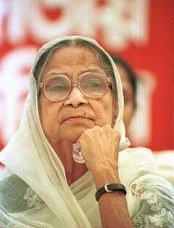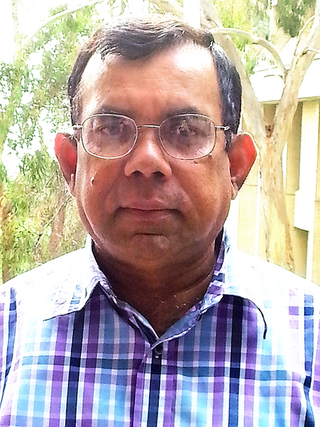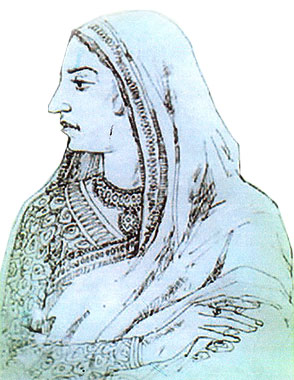See also
- Indian English literature
- Social reformers of India
- The Begum's Fortune , an 1879 utopian science fiction novel by Jules Verne
- Kithaab
| Author | Begum Rokeya |
|---|---|
| Country | British India |
| Language | English |
| Genre | Feminist, Utopian fiction |
| Publisher | The Indian Ladies Magazine |
Publication date | 1905 |
| Pages | 220 |
| Preceded by | Matichur 1st Vol. (1904) |
| Followed by | Matichur 2nd Vol. (1922) |
Sultana's Dream is a 1905 Bengali feminist utopian story in English, written by Begum Rokeya, also known as Rokeya Sahkawat Hossain, a Muslim feminist, writer and social reformer from Bengal. [1] [2] It was published in the same year in Madras-based English periodical The Indian Ladies Magazine. [3] [lower-alpha 1]
It depicts a science fiction feminist utopia called Ladyland, in which women run everything and men are secluded, in a mirror-image of the traditional practice of purdah . The women are aided by technology which enables laborless farming and flying cars; the women scientists have discovered how to trap solar power and control the weather. This results in "a sort of gender-based Planet of the Apes where the roles are reversed and the men are locked away in a technologically advanced future." [4] [5]
There, traditional stereotypes such as “Men have bigger brains” and women are "naturally weak" are countered with logic such as "an elephant also has a bigger and heavier brain" and “a lion is stronger than a man” and yet neither of them dominates men. [3] In Ladyland crime is eliminated, since men were considered responsible for all of it. The workday is only two hours long, since men used to waste six hours of each day in smoking. The religion is one of love and truth. Purity is held above all, such that the list of "sacred relations" ( mahram ) is widely extended. [5]
According to Hossain, she wrote Sultana's Dream as a way to pass the time while her husband, Khan Bahadur Syed Sakhawat Hossain, a deputy magistrate, was away on a tour. Her husband was an appreciative audience and encouraged Hossain to read and write in English. Thus, writing Sultana's Dream in English was a way of demonstrating her proficiency in the language to her husband. Sakhawat was very impressed by the story and encouraged Hossain to submit the piece to The Indian Ladies Magazine, which published the story for the first time in 1905. The story was later published in book form in 1908. [6]
Hossain (1880-1932) was born into a rich family who owned land. Though she knew how to read and write in Urdu, she was prevented from learning Bangla and English. In those days, English was seen as a language that would expose girls to new ideas, which society thought unsuitable. Rokeya learned to read and write English and Bangla with the help of her elder sister and elder brother. She wrote Sultana's Dream when she was merely 25 years old. In 1910, she started a school for girls in Kolkata and to this day, the school is in operation.
In 2018, the Indian-American artist Chitra Ganesh created 27 linocuts to illustrate the story. [7] [8] [9]
Feminist science fiction is a subgenre of science fiction focused on such feminist themes as: gender inequality, sexuality, race, economics, reproduction, and environment. Feminist SF is political because of its tendency to critique the dominant culture. Some of the most notable feminist science fiction works have illustrated these themes using utopias to explore a society in which gender differences or gender power imbalances do not exist, or dystopias to explore worlds in which gender inequalities are intensified, thus asserting a need for feminist work to continue.
Science fiction and fantasy serve as important vehicles for feminist thought, particularly as bridges between theory and practice. No other genres so actively invite representations of the ultimate goals of feminism: worlds free of sexism, worlds in which women's contributions are recognized and valued, worlds that explore the diversity of women's desire and sexuality, and worlds that move beyond gender.
Sultana or Sultanah may refer to:

Pardah or purdah is a religious and social practice of female seclusion prevalent among some Muslim and Hindu communities. It takes two forms: physical segregation of the sexes and the requirement that women cover their bodies so as to cover their skin and conceal their form. A woman who practices purdah can be referred to as pardanashin or purdahnishan. The term purdah is sometimes applied to similar practices in other parts of the world.

Rokeya Sakhawat Hossain, commonly known as Begum Rokeya, was a prominent Bengali feminist thinker, writer, educator, professor, teacher and women empowerment and political activist for Muslim girls from East Bengal, undivided Bengal in present-day Bangladesh.

Begum Sufia Kamal was a Bangladeshi poet, feminist leader, and political activist. She took part in the Bengali nationalist movement of the 1950s and civil society leader in independent Bangladesh. She led feminist activism and was a president of Bangladesh Mahila Parishad. She died in 1999 and was the first woman to be given a state funeral in Bangladesh.

The Begum's Fortune, also published as The Begum's Millions, is an 1879 novel by Jules Verne, with some utopian elements and other elements that seem clearly dystopian. It is noteworthy as the first published book in which Verne was cautionary, and somewhat pessimistic about the development of science and technology.
Barnita Bagchi is a Bengali-speaking Indian feminist advocate, historian, and literary scholar. She is a faculty member in literary studies at Utrecht University, and was previously at the Institute of Development Studies, Kolkata at the University of Calcutta. She was educated at Jadavpur University, in Kolkata, St Hilda's College, Oxford, and at the Trinity College, Cambridge.

Chitra Ganesh is a visual artist based in Brooklyn, New York. Ganesh's work across media includes: charcoal drawings, digital collages, films, web projects, photographs, and wall murals. Ganesh draws from mythology, literature, and popular culture to reveal feminist and queer narratives from the past and to imagine new visions of the future.

Mohammad A. Quayum is an academic, writer, editor, critic and translator.

Nawab Begum Faizunnesa Choudhurani was Zamindar of Homnabad-Pashchimgaon Estate in present-day Comilla District, Bangladesh. She is most famous for her campaign for female education and other social issues. In appreciation of her social work, in 1889 Queen Victoria awarded Faizunnesa the title of "Nawab", making her the first female Nawab in South Asia.
Bangladeshi English literature (BEL) refers to the body of literary work written in the English language in Bangladesh and the Bangladeshi diaspora. The historical background of interpolation of English in this region dates back to the British colonial period. English touched the land through the historical process—the historical process of British colonization over the land. However, the thought of creative writing in the colonizer's language inflames the idea that it is a deliberate choice by the native people who exploit—to emphasize more—the language in a way which exceeds the possibility of language to be used only as a communicative medium. Here the first question comes to the issue of taking up English as a medium of creative writing, in which Bankim and Michael Madhusudan underwent a deliberate trial to emerge as writers. The process of writing in English is ever-expanding and now uses a new term, "Bengali English Literature", rather than "Bangaladeshi English Literature". In academia, it is also now referred to as Bangladeshi Writing in English (BWE). Early prominent Bengali writers in English included Ram Muhan Roy, Bankim Chandra Chatterjee, Begum Rokeya and Rabindranath Tagore. In 1905, Begum Rokeya (1880–1932) wrote Sultana's Dream, one of the world's earliest examples of feminist science fiction. Modern writers of the Bangladeshi diaspora include Tahmima Anam, Neamat Imam, Monica Ali and Zia Haider Rahman.

Aline Valek is a Brazilian writer, novelist, editor and illustrator. She is from Governador Valadares, Minas Gerais but moved to Brasilia early in her life. She graduated in Advertising and Propaganda at the Higher Education Institute of Brasilia, Brazil. She has published two books and currently works as a columnist for Carta Capital, a Brazilian weekly magazine.
Basanti Devi was an Indian independence activist during the British rule in India. She was the wife of activist Chittaranjan Das. After Das' arrest in 1921 and death in 1925, she took an active part in various political and social movements and continued with social work post-independence. She was awarded the Padma Vibhushan in 1973.
Feminism in Bangladesh seeks equal rights of women in Bangladesh through social and political change. Article 28 of Bangladesh constitution states that "Women shall have equal rights with men in all spheres of the State and of public life".
Anwara Bahar Chowdhury was a Bangladeshi social activist and writer.
Husna Banu Khanam was a Bangladeshi educationist, writer and Nazrul singer. She was a pioneer of Bengali Muslim women journalism. In 1999, she received the Ekushey Padak Award for her contribution in music, and in 2004, she received the Begum Rokeya Medal for her contribution to the socio-economic development of women by the Government of Bangladesh.

Hasna Begum was a Bangladeshi philosopher and feminist, and a professor of philosophy at the University of Dhaka until her retirement in December 2000.
Masuda Khatun (1885–1926) was a pioneering Bengali feminist and secularist. Her pen name was Mrs M Rahman.
Nabanoor was a monthly Bengali literary magazine published from Kolkata. It was a progressive magazine that encouraged contribution by both male and female authors.